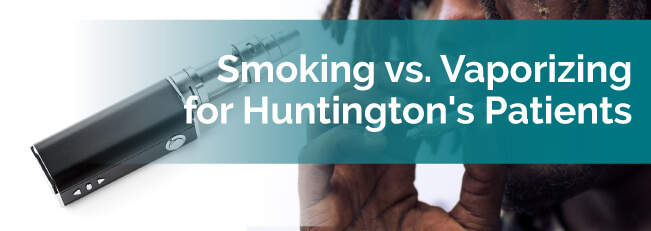
For patients with Huntington’s Disease, daily activities and even simple personal tasks become extremely difficult as the disorder progresses. The inherited condition is caused by a breakdown of nerve cells in the brain. Huntington’s is progressive and incurable, so most treatments for the disease aim to help patients deal with the debilitating symptoms as they develop and worsen.
Although there are many medications used as Huntington’s treatments, they often have adverse side effects. Medical marijuana is making a lot of noise in the medical scene. It can be used to treat some of Huntington’s most painful and debilitating symptoms, plus, it can ease the side effects caused by other medications.
The most popular methods of using cannabis are by smoking or vaporizing. Both methods are fast-acting, allowing patients to receive almost instantaneous relief. However, one of the side effects commonly associated with Huntington’s is decreased respiratory function. Find out which ingestion method may be better for Huntington’s patients.
There are three stages for Huntington’s. Early stages involve the onset of subtle symptoms, which could include decreased motor function, where the patient appears clumsy, or changes in personality or mood. Slowly, symptoms will start affecting a patient’s ability to work and perform other activities.
During the second and third stages, the ability to move and think are seriously impacted. The disorder is also accompanied by severe psychological symptoms that can change the patient’s personality. At this stage, patients may notice respiratory function is becoming more difficult. Finally, at its worse, the condition takes away the patient’s ability to care for themselves, making them entirely dependent on others.
Medical marijuana can help many of the symptoms associated with Huntington’s disease, including:
At the second or third stages of Huntington’s Disease, patients may notice breathing becomes more difficult. Doctors have found two primary reasons for this:
Some feel that marijuana isn’t a safe medication for Huntington’s patients because of their reduced lung function. They feel smoking or vaporizing cannabis could be more harmful to the patient. However, the benefits of medical marijuana to Huntington’s patients far outweigh the dangers. Particularly in later stages of the disease, most care is palliative and meant to ease the pain of the disease. Medical marijuana brings the relief these patients need.
Because patients with Huntington’s have difficulties swallowing in the second and third stages of the disease, eating cannabis-infused edibles is difficult. The best options for using medical marijuana medications are either smoking or vaping.
Smoking marijuana involves burning the cannabis and inhaling the smoke — there are different ways to do this. The most common is with rolling paper, but you can also use a hand pipe, water pipe, hookah or unconventional home-made pipes. These are easy to set up, allowing patients to get the relief they need quickly.
The biggest concern with smoking is, well, the smoke. The smoke produced can be very irritating, especially to patients who already have respiratory difficulties. When cannabis burns, harmful toxins are released, although not as many as cigarettes.
When vaporization is used to inhale cannabis, the marijuana is heated to a temperature just below combustion. Meaning the product never burns and doesn’t release as many harmful toxins. There are several ways of vaping, including vape pens, desktop or portable vaporizers.
Vaping seems to have many advantages over smoking:
Although the effects of vaping are just as fast-acting as smoking marijuana, it takes longer to prepare a vaporization apparatus. Not only do you have to set up the vaporizer, but you also must grind the cannabis to a very fine consistency. Also, portable vaporizers are more expensive to purchase.
If you feel that medical marijuana would be a good treatment option for you or a loved with Huntington’s disease, contact a medical marijuana doctor today to find out more — our advice shouldn’t replace that of a medical professional. You can also visit a local dispensary to speak with a qualified budtender.
For more information about how cannabis can be used to treat Huntington’s Disease, check out our resources:


Please allow us to access your location to find local dispensaries.
VIEW ALL DISPENSARIES ➔